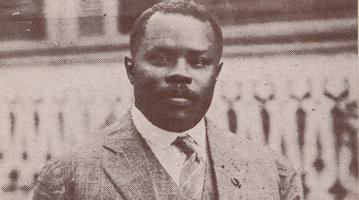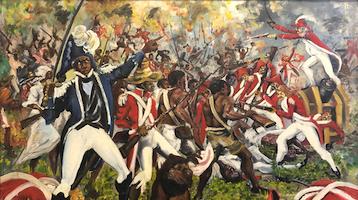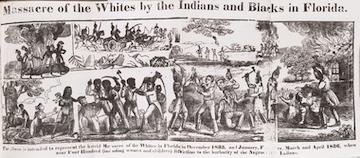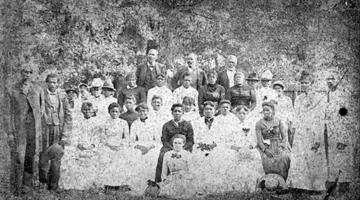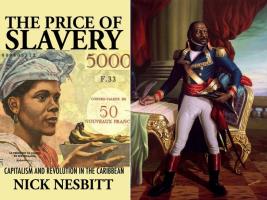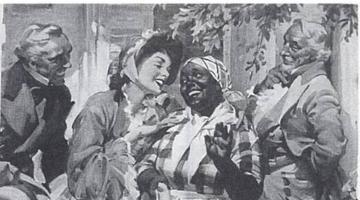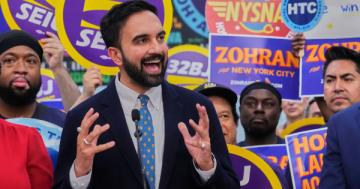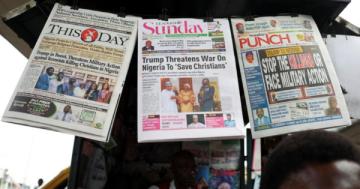Exploited within the belly of the beast, the struggle for Black emancipation cannot avoid its global ramifications when it comes to ending the hegemon’s domestic violence and global destructiveness.
“The rise of English manufacturing and capitalism was indeed promoted from cotton fields the world over but eventually from American plantations.”
What of Black American History? To some who might consider historical inquiry a Eurocentric endeavor, they might risk then to find themselves in agreement with the German philosopher G. H. F. Hegel who claimed in the 1830s that Africa was “no historical part of the world;” and that it had “no movement or development to exhibit.” Of course, many scholars have studied such erroneous claim and no one holds such beliefs any longer. Undeniably, history and historiography have been a serious concern for European scholars but have definitely not been a uniquely European intellectual privilege. Already, the Islamic medieval scholar Ibn Khaldun (1332-1406) writing at a time when Europe itself remained plunged in the obscurantism of its Middle Ages, suggested students of history the following: 1) to have an understanding of the rules of politics and the nature of people; 2) to have knowledge of the natural environment and how it differs according to time and place; 3) to be acquainted with the social environments of the various different nations in terms of way of life, morals, incomes, doctrines and so forth, 4) to have an understanding of the present time and an ability to compare it with the past and 5) to have knowledge of the origins and motives of states and sects, their declared principles, their rules and major events in their histories. Despite Ibn Khaldun’s difficulties to apply his own principles to sub-Saharan Africa, a history Africa certainly has. It is very clear nevertheless that following these five principles for historical inquiry, history cannot be reduced to or result from the simple post-facto chronological listing of recollected events or from victors’ interpretations of the past.
Yet relative to chronological listings whether by victors or by any others, some historical events do stand out whose impacts on humanity reach well beyond these chronological listings of local past events. Even though the Slave trade and Slavery remain listed as some of the many events making up the historical landscape of the United States and the African diaspora in North America, we submit that the Slave Trade and Slavery is not just one event among the many of American history but is a social, political historical event whose repercussions go well beyond a chapter in history books, well beyond regional and national American history, and whose repercussions are consequential not just for the American Black population and African diaspora but for the whole of humanity.
“Slavery is a social, political historical event whose repercussions go well beyond a chapter in history books.”
At the end of World War II, for many historians, scholars and the public as well, the world after 1945 ceased to be as people knew it until then. Not, unfortunately, because of the tremendous loss of lives this world war inflicted on so many people but because for the first time in recorded history, humanity had revealed a power of self-destruction unknown until then. The application of bureaucratic industrial rationales throughout Nazi controlled territories to the mass production of death enabled human beings to kill on a scale and with a speed unseen and to “scientifically” realize the colonialist ambitions of exterminating entire groups of human beings. As it was, the dawn of the second World War came to be tragically punctuated with the terrifying mushroom clouds over the cities of Hiroshima and Nagasaki introducing the world to a power of destruction beyond imagination. Since then and to this day, human beings have been living on the edge of world destruction – more precisely, 100 seconds to midnight according to the Doomsday Clock. We now live with the fact that we can completely self-annihilate. This terribly frightening reality is extremely difficult to actually grasp because there seem to be no way to alter this readily. And yet we live in the deep shadow of this threat on a daily basis. These two events changed the world forever and the role of human beings in history. The world will exist only insofar as human beings wish to keep it in existence.
If the Holocaust and the Atom Bomb have changed humankind in irrevocable ways, we claim that Slavery and the Slave Trade, albeit in different ways, have also radically changed the world as it was known before its brutal implementation, from Europe to Africa and the Americas.
Today, the Western world certainly but the world at large has yet to process this undeniable historical fact characterizing the basest instance of exploitation of human beings by human beings on such an industrial scale, namely the transport of over 12.5 million human beings for their express brutal exploitation as forced labor in the Americas.
“Slavery and the Slave Trade, albeit in different ways have radically changed the world as it was known before its brutal implementation.”
The industry of slavery and its contemporary consequences is the result of a complex synthesis of the variables of race, culture, and economics across history that defies any attempts at reducing it to any one of these variables. But Slavery and the commerce of African human beings heralded the social, economic and international transformation of the world from feudalism to capitalist societies throughout Europe and the Americas in anticipation of the imperialism yet to come. The rise of English manufacturing and capitalism was indeed promoted from cotton fields the world over but eventually from American plantations. In the face of Slavery’s inhumanity, if European first and North American capitalism later eradicated the Slave industry proper, the principle of human exploitation to this day remains one of the economic foundations and a pillar of capitalism in the United States, Europe and the world over.
Capitalism did grow, its imperial reach expanded and the United States found itself, after the so-called fall of the Soviet Union, the apparent sole superpower on the surface of the Globe and acted accordingly in carrying on its fantasized manifest destiny as the exceptional nation to rule supreme on the planet, economically, financially, militarily and not least culturally. Yet the time of history, far from being over as some might have assumed, keeps on moving forth. So much that today many observers explicitly demonstrate in objective terms the decline of the US hegemon. The shock caused by the pandemic, with its health and economic catastrophic consequences in the wake of the 2008-09 crisis befell upon an American population laboring to absolve itself of any wrong doings and struggling to dispel its worries by embracing survivalist or misguided hopes. From Making America Great Again to Building America Back Better; nostalgic delusions of past grandeurs keep on prevailing over historical and socio-economic realities.
Unfortunately, yet unsurprisingly, in the midst of these crises, both past, on-going and immediate, the conditions of African Americans, of Black communities, remain dismal and no less of a social catastrophe. This suffering buffers the loud echo of history still resonating throughout the country underneath the delusional drums of conservative, liberal or pseudo-progressive political rhetoric. Slavery and the Slave Trade continue to emerge from the fog of memories throughout the present social and political repression and the struggles for liberation; struggles that keep on unabated despite the many attempts at so-called reforms and transformations. The heavy weight of history refuses to be dismissed at will and history persists in resurrecting that which has been to this day actively suppressed, repressed and oppressed. But we must ask, how can it be addressed? How can the very event that bore the flourishing of American, English and European capitalism be addressed without addressing capitalism itself? This is the contradiction it cannot solve. Capitalism cannot willingly negate itself. American capitalism cannot do away with the fact of its own constitutive history. Even if it wanted to, it could not; as we can witness, even today, the many failed or feigned attempts at taking Black communities into account. It can only address the cosmetic, superficial redress of representations. It cannot change its very exploitative foundation, the violent pillar of its structural make up. Capitalism cannot but be capitalism. And because Slavery was constitutive of capitalism, because it is weaved in its very fabric, capitalism cannot possibly address these events without threatening its own existence. And proof is that to this day, the issue of race, poverty and exploitation -- the very historical and active contemporary traces of Slavery -- cannot be redressed substantially in any ways whatsoever. Capitalism cannot help but to lead to its own destruction; unfortunately, and seemingly insisting on taking others down with itself.
“From Making America Great Again to Building America Back Better; nostalgic delusions of past grandeurs keep on prevailing over historical and socio-economic realities.”
What are the implications of these observations? The Holocaust and the Atomic bombings of Japan were introduced at the beginning of this text to illustrate how actions by human beings through history can have repercussions well beyond the acts themselves. The Horrors of the Holocaust points to the inhumanity of human beings and the Atomic bombings to total human self-destruction. The acts themselves, killings and bombings, horrific as they certainly are, can be understood within the particularities of their occurrences. The Holocaust can be understood, for instance, as the result of Nazi ideology while the dropping of the Atomic bombs was purported, according to some, to save American soldier’s lives. Whether these interpretations are accurate or not rests on the debate between scholars’ interpretations about these particular events. But in both cases, the Holocaust and the Atom Bomb also take on a dimension that speaks of human beings as homo sapiens and the consequences of their actions onto humankind as a whole. The Holocaust is more than mass killings, the Atom Bomb is more than a Bomb and Slavery is more than the commerce and exploitation of African Human beings.
The Slave trade and Slavery are indeed events that can be studied and understood to be specific to a certain period of history, carried out by specific people in specific places, but we can also, and this is the purpose of this essay, understand Slavery and the Slave Trade as an Event characterizing humankind’s activities and its propensity in capitalism, within a historical period, to uphold and value human beings’ powers to exploit other human beings in the basest of fashion.
In this light, we could say that Slavery stands as the blueprint, the archetypal representation of human exploitation by other human beings in the same way the Atom Bomb represents human beings’ power to completely self-destruct. It stands as the event, although repressed, that becomes the very representation of the ethics of capitalism. It is a historical reality, which capitalism has actively and aggressively labored to dismiss, reframe and relinquish to its historical dustbins as a particular, past and temporary happenstance; a labor nevertheless that has proven to be completely futile in the face of history’s insistence to return.
Following this logic, we can lay the claim that the African Slave Trade and the industry of Slavery may come to stand and to represent the universal exploitation of any human beings by other human beings with its inevitable consequence, the universal struggle against exploitation. This premise allows for the formulation of what I would term the Universality of the Black Struggle. As a universal construct Slavery stands as the universal, unavoidable condemnation of this foundational contradiction of capitalism and imperialism in their global and monopolistic forms.
‘Slavery stands as the blueprint, the archetypal representation of human exploitation by other human beings in the same way the Atom Bomb represents human beings’ power to completely self-destruct.”
Anticipating that some may think that such claims will coopt and dissolve the particulars and specifically African American dimensions of the racial conflict in the United States, some points of clarifications must be made. First it must be made clear that we are not comparing here the Holocaust, the Atomic Bombings of Japan with Slavery. We are only illustrating how certain historical events do alter the world in ways not imagined before, well beyond their occurrences in time and geography. Second, we must clarify what we mean by the notion of “Universal.” It can, of course, be understood as a European hegemonic construct. In the colonial frame, the values of the colonial power have characteristically been imposed upon subjugated colonized populations as universal values, excluding in the process all other (said to be relative and particular) value systems of colonized populations. As Naomi Sakai (1997) states, “What we normally call Universalism is a particularism thinking itself as universalism. It is doubtful whether universalism could ever exist otherwise.” This has definitely been the hallmark of much of Western thinking. But the fact remains that every culture, those in the West included, elaborates constructions and views of the world in which it exists that are exclusively proper to that culture. Nevertheless, considering the fallacy of the colonialist’s universalism forces us to, of course, relativize the idea of universals. Even universal laws of science may come to be altered pending newfound theories or discoveries. Universals may be altered in content over time yet remain.
In this text, however, we wish to make a distinction between the universality/relativity of worldviews, theories or narratives and the universality of a historical event. With the latter in mind, the occurrences of the Holocaust and the Atomic Bombings of Japan cannot just be reduced to their relative interpretations. They are undeniable facts with material consequences for human beings still to this day. Consequently, we will make the general claim that the impact of some events can be such that it does reach beyond the actual event itself even though that event also took place within a limited period of time, a specific geography, experienced by a certain number of people. We will say that an event can be appreciated in its universality when its consequences and its reach alter humanity and the world at large above and beyond its local effects. In which case, the event can no longer be reduced only to its local and relative occurrence and interpretation. Such is the case, we submit, with Slavery and the Slave trade as a historical and undeniable fact; a fact that is the very ground from which the Black Struggle emerged, both in its particular and, we submit, in its universal forms.
Furthermore, stating that the Holocaust and the Atomic Bombings of Japan had consequences beyond the events themselves does not mean in any way -- and this should be stressed -- that the horrific experiences actually suffered by people in Auschwitz, Dachau or Buchenwald, or by those who became the victims of Nuclear attacks with their radioactive fallouts can be omitted, dismissed or reduced in significance whatsoever, on the contrary!
Pertaining to our address of the Slave Trade and Slavery as a Universal Event, we wish to emphasize that considering the Black struggle in its Universal dimension does not in any way whatsoever reduce nor diminish the actuality, the significance and the power of particular Black and working class Struggles across communities, cities, counties and countries. Moreover, it must be clear that the Universal appraisal of Slavery in its Historical dimension does not contradict any appraisal of past and present racial and economic conflicts in all their pluralism, whether it is in terms of Civil Rights, Black liberation Theology, Black Socialism, Nationalism, Pan Africanism, Feminism, Internationalism, anticolonialism or anti-imperialism, nor does it dismiss any of the claims made by the Black struggle.
Both particulars and universals can co-exist and are not mutually exclusive, on the contrary. It is not a question of either/or. This is precisely what leads us today to consider, not so much the particulars of the Black Struggle as it is carried on actively and purposefully across communities in its pluralism but its universal aspect in relationship to humankind and History with a capital H. In doing so, it becomes possible to grant the events of the Slave Trade and Slavery its appropriate place in world history and its impact in transforming the world with its clear consequences across the planet; inaugurating the rise and emergence of industrial monopoly capitalism and its imperialist expansion.
Thus, we could rightfully state that what started with Slavery ends with contemporary capitalism (neoliberalism) by way of the Holocaust and the Atomic Bomb. Since then, the social system based upon the exploitation of humans by humans continues on, incapable of addressing critically its constitutive foundation of relentlessly producing commodities towards exploitative ends, be they humans or otherwise. Today the Black Struggle against racism and capitalism, for justice, equality and dignity is the contemporary symbolic representation of the struggle of all oppressed people against injustice, for equality and dignity. The Black Struggle represents the struggle of all human beings, of historical homo sapiens for a better world while at the same time fueling the particular contemporary struggles of the African American Diaspora in confronting the institutional and systemic repressions born from white supremacist and monopoly capitalism.
“What started with Slavery ends with contemporary capitalism (neoliberalism) by way of the Holocaust and the Atomic Bomb.”
In light of the Universalization of the Black struggle, the particulars of the struggle of the African American Community to liberate itself from exploitation, can be identified as well as the symbolic representation of revolutionary struggles across the globe and for all exploited human beings. Exploited within the belly of the beast, the struggle for Black emancipation cannot avoid its global ramifications when it comes to ending the hegemon’s domestic violence and global destructiveness.
Philosophically, if the Black struggle represents the symbolic Universal Struggle of all oppressed people across the globe, the praxis of this construct will then lead to the material and concrete reality that political changes for the benefit of Black communities will inevitably lead to beneficial changes for all oppressed and exploited people within the US and so it goes that consequent political changes within the United States will imply changes for the rest of the planet subjected to its imperial claw. The local, national struggle is also the international Struggle. The internationalist dimension of the Struggle cannot be divorced from its Universal dimension. The quest for international political support is bound to both the national and the international recognition of the Universal dimension of the Black Struggle beyond yet within the various, diverse and particular forms the struggles take on locally in the United States.
Grasped in its Universal dimension, the Black Struggle takes on an urgency reflecting not only the condition of Black communities within the United States but the conditions of exploited communities suffering from capitalist expropriation and exploitation throughout the world as well as the climate catastrophe resulting from uncontrolled and relentless imperialist resources extractions of the previous centuries to today.
Addressing the Universality of the Black Struggle means to acknowledge Slavery as a turning point Event, in the transformation of the modes of productions characteristic of the industrial revolution and in the history of humankind with the consequent transformation of the world as it was known. Relationships between cultures, countries and human beings have been irrevocably altered since and to this day. The contemporary racial and political conflicts are the inevitable consequences of the social transformations born from Slavery and from the very system that emerged through and from it.
In conclusion, we can state that the Universalization of the Black Struggle, the on-going abolishing of Slavery and its contemporary consequences, of the exploitation of human beings as it stands today is the Universalization of the struggle for achieving equality, justice and dignity for all human beings. In that light we can further claim that the Black liberation Movement is the very contemporary representation of humanity’s hope for a better future if one is to have any future at all… To repeat the question, will it be Socialism or barbarism?
K. Philippe Gendrault, Ph.D. is a clinical psychologist and psychoanalyst who is committed to the anti-racist, anti-imperialist struggle for social and political justice.
COMMENTS?
Please join the conversation on Black Agenda Report's Facebook page at http://facebook.com/blackagendareport
Or, you can comment by emailing us at comments@blackagendareport.com

